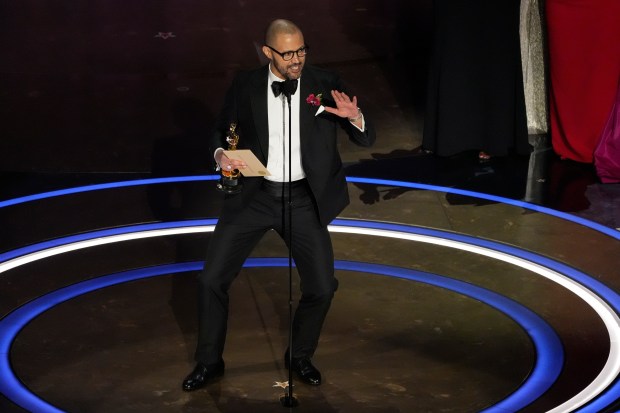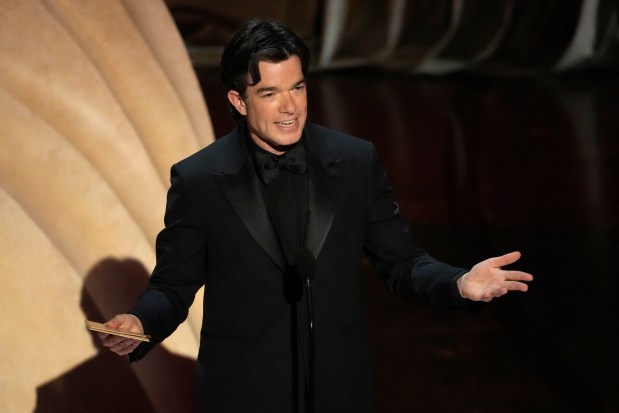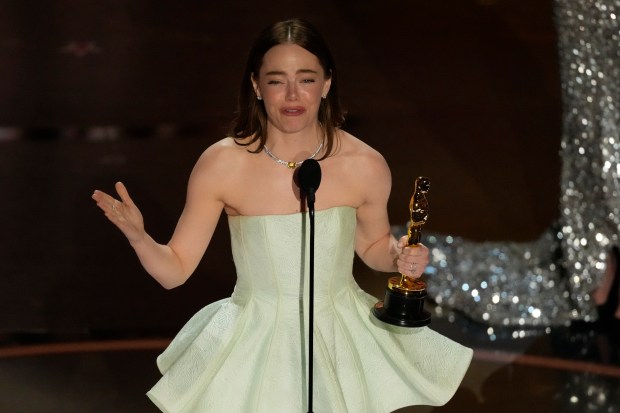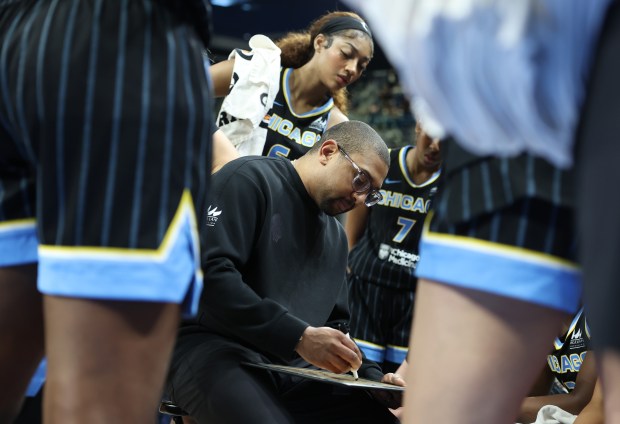For the civilian in me, the one with a 50-year rap sheet of annual Oscar night viewership dating back to “The Sting,” Sunday’s Academy Awards went down nice and easy. Same goes for the critic me. We were both happy.
Best Oscars show in several years. Surprising, yes?
Yes. Especially given the expected and ultimately fulfilled dominance of front-runner “Oppenheimer” — seven wins, including for best picture, best director (Christopher Nolan), best actor (Cillian Murphy), best supporting actor (Robert Downey Jr.), plus cinematography, musical score and editing — and hardly any awards constituting an upset. Minimal upsets plus zero train-wreck moments (no Will Smith violence; no envelope mix-up, though I did love the tiny jump scare Al Pacino provoked with his abrupt reveal of the biggest award of the night) typically means bleh TV. So why was the 96th running of the bull Sunday such a surprise, even without actual surprises?
Here are five theories that, stitched together, form one big Frankentheory, in honor of Emma Stone’s Oscar-winning portrayal of Bella Baxter in “Poor Things.”
1. The quality of goods on display: Way up this year. Take the 10 best picture nominees. Even “Maestro,” the one arguably least deserving of inclusion, had some terrific elements and scenes in its corner. The Thanksgiving Day argument between Leonard and Felicia Bernstein (Bradley Cooper, not the evening’s happiest attendee, and best actress nominee Carey Mulligan) made the rest of the movie’s relationship details feel either dodgy, phony or rushed. But look, compared to some of the lesser titles filling out recent best picture nomination lists? “Elvis” in 2022? “Don’t Look Up” in 2021? “Promising Young Woman” in 2020? “Jojo Rabbit” in 2019? “Bohemian Rhapsody” and “Green Book” in 2018?
2. The actual, unironic love and respect in the room: So many Oscar ceremonies arrive in righteous sanctimony without much in the way of interesting things to say in between numbers. This year was different, and better. The production itself sold its various presentation concepts, such as rounding up five previous Oscar winners to introduce this year’s performing categories, with a shrewd blend of wit and heart. And when certain winners took the stage and took the opportunity to express a view or two, miraculously it kept the show moving.
3. Now that’s how you go political: Quick, civil but pointed, and move on. Footage of the late Russian dissident, Putin enemy and likely Putin casualty Alexei Navalny, slipped into the show Sunday night in a beautiful and moving way. Also brief. Just right. Elsewhere, winning the international feature Oscar, “Zone of Interest” writer-director Jonathan Glazer referred to his film’s depiction of dehumanization in relation to Hitler’s Third Reich as well as linking it to Israel’s invasion of Gaza: “Right now, we stand here as men who refute their Jewishness and the Holocaust being hijacked by an occupation which has led to conflict for so many innocent people.” No stridency, no reiterations, just clear opinions eloquently expressed, with one eye on the clock.

4. It’s fair game to take on the local industry on the industry’s biggest night: Oscar winner Cord Jefferson, who adapted (and directed) “American Fiction,” maximized his speech time by calling out the conglomerated, amalgamated, any-old-tentpole-in-a-storm mess that is contemporary Hollywood. Instead of throwing dice at a $200 million franchise burger, Jefferson said, “why not try making twenty $10 million dollar movies?”
5. When a sound designer gets an Oscar-night standing ovation, something is working: For “The Zone of Interest,” designer Johnnie Burn and production sound mixer Tarn Willers created a welter of ghastly everyday horrors, largely unseen but ever-present: furnaces, gunshots, screams, not quite realistic, not quite fantastic. It’s design genius of monstrous subtlety. My friend Eric Lindbom texted me from a Los Angeles Oscar party and said it first, and best: Not since “The Conversation” in 1974 has there been a feature so reliant on such a brilliantly detailed soundscape.

While we’re on it: When a film as bracing as “The Zone of Interest” garners five Oscar nominations, in an especially rich year, the Academy members are doing something right. They, and we, got an entertaining awards show in the bargain. Four-time MC Jimmy Kimmel? Solid. Coming off Jo Koy’s herniated hosting effort at the Golden Globes two months ago, I’ll take solid and easygoing, no questions asked.
Emily Blunt squared off against Ryan Gosling for a grudge match of a “Barbenheimer” peacekeeping mission. Quite droll. So was Kate McKinnon. And special thanks to John Mulaney for a transcendent non-sequitur riff on “Field of Dreams” dream logic, smack in the middle of introducing the category of best sound design. Long comic odds, for sure. But Mulaney found gold.
I suppose you had to be there, or rather anywhere, somewhere, watching. But this is why morning-after YouTubing has a secure place in this world. And amazingly — for a while longer — so does Oscar.
Michael Phillips is a Tribune critic.




